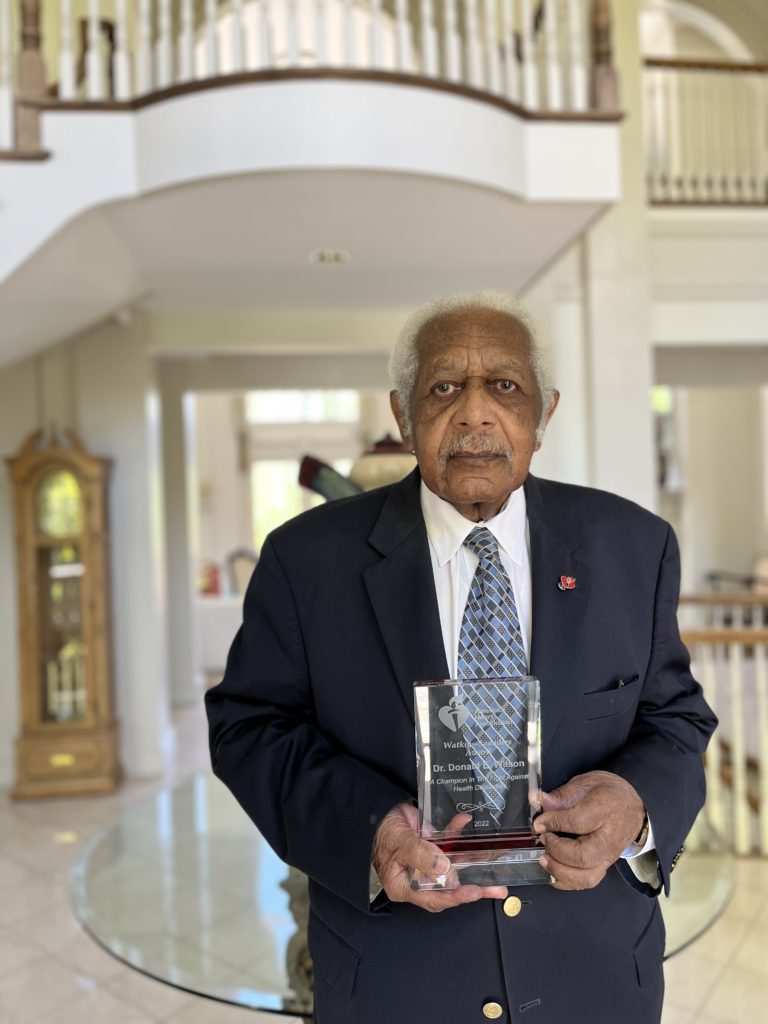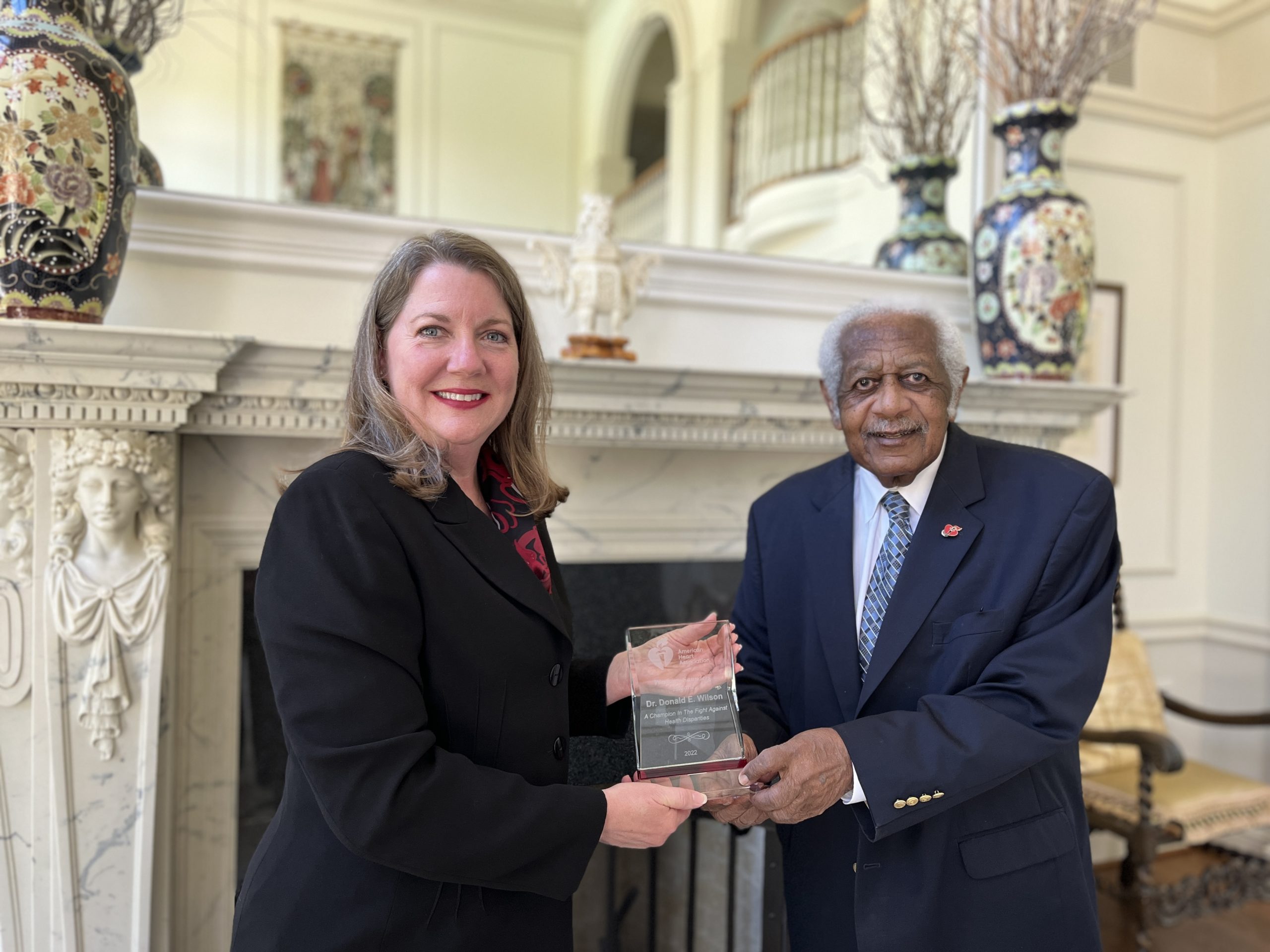Donald E. Wilson knew he was going to be a doctor from the time he was about 9 years old. Growing up in Worcester, Massachusetts, he had gotten ill, and his family called a doctor to the house who gave him an injection.
“I got better. I was impressed,” Dr. Wilson, 86, recalled. “I said, ‘This is great, I’m going to be a doctor when I grow up.’ And I never changed my mind.”

Along the way, though, Dr. Wilson noticed something. Other doctors in his community didn’t look like him.
“There was only one doctor of color in the town,” said Dr. Wilson, who is Black. “So I realized, even then, we had a deficiency of representation in terms of who you could go see – not that white doctors wouldn’t see you – but if you were more comfortable going to a person of color, you only had one choice in all of Worcester, Massachusetts.”
That trend continued when he attended college at Harvard, where he was one of seven black students in his class of 1,172. He graduated from Tufts University School of Medicine in 1962. “I never saw a black professor.”
Dr. Wilson has spent much of his career trying to change that and addressing other health disparities and inequities. In 1991, he became Dean of the University of Maryland School of Medicine, becoming the first Black dean at a primarily white medical school in the United States.
The American Heart Association of Baltimore & Greater Maryland is honored to recognize Dr. Donald E. Wilson as the recipient of the 2022 Watkins-Saunders Award.
Established in 2012 to honor two of the AHA’s greatest volunteers – the late Dr. Levi Watkins and the late Dr. Elijah Saunders – the award is bestowed upon individuals or organizations in Maryland that have been champions in the fight against health disparities and inequities.
The award was officially presented to Dr. Wilson during a virtual ceremony on May 19.
A gastroenterologist, Dr. Wilson said being named this year’s Watkins-Saunders honoree was surprising, but a great honor, because the award “goes beyond the discipline of heart disease and stroke, and it talks about an issue that is universal in health care in our country right now. And that’s the issue of health disparities, which in part is due to the lack of diversity of healthcare providers and the decision makers in our country today.”
While Dr. Wilson did not work directly with Dr. Watkins, he and Dr. Saunders were close. In fact, it was the latter who repeatedly encouraged him to apply to be Dean at University of Maryland, and went directly to the school’s president demanding Wilson be interviewed for the post.
With his bona fides — which included being the youngest person to achieve full professor status at the University of Illinois Medical School, and serving as physician at University Hospital and Kings County Hospital Center in Brooklyn, New York, while serving as chair of Medicine at SUNY Health Science Center — Dr. Wilson could not be denied.
But once he was named dean, he still faced an uphill battle on several fronts.
“My first meeting with my chairs and program directors, I was in a room with 25 people, 20 of whom thought they should be the dean … who thought they could do the job better than I could. So that was an interesting start,” he said. “To say there was racial bias would be an understatement.”
Additionally, he came into the position facing the challenge of state-mandated budget cuts.
In spite of this, Dr. Wilson was able to increase staff at the school of medicine during his tenure, which lasted until his retirement in 2006. On his watch, the number of female faculty members increased by 75% and the number of minority faculty members tripled.
“I didn’t come to Maryland to increase diversity; I came to Maryland to improve the medical school,” he said. “I believe you can’t reach the best possibilities, unless you have a diverse group of people working with you and advising you. So, increasing diversity was going to help the medical school no matter what happened.”
He also implemented curriculum changes that included more practical, hands-on instruction, and he grew research funding for UMSOM from $77 million to $341 million, among the highest of American medical institutions at the time.
“We went from the fourth quintile in external research funding when I arrived in 1991, to the top quintile when I retired in 2006,” he said.
In addition to serving as dean, Dr. Wilson held several leadership positions in medical and academic organizations throughout his career, including chairing the Association of American Medical Colleges in 2004, chairing the Maryland Health Care Commission from 1994 to 2004, and founding the Association for Academic Minority Physicians.
Along the way, Wilson also became the role model for people of color who wanted to practice medicine or enter academia.
“We started getting more students of color who were interested in the University of Maryland. Me being at Maryland as a role model, they assumed that might make it a friendlier place,” he said.
But he also served as an inspiration for others seeking leadership roles in academia.
“Dr. Wilson is so well-deserving of this award. This recognition is really important not only to Dr. Wilson, but for all of us, because he has been such a role model,” said Dr. Eve Higginbotham, who Wilson appointed in 1994 as the chair of the Ophthalmology Department at the University of Maryland School of Medicine.
In doing so, Dr. Higginbotham because the first woman and first African-American to chair an ophthalmology department at an academic medical center in the United States.
“He is such a visionary. He envisioned University of Maryland being in the top medical schools in the country, and he certainly achieved that and more,” said Higginbotham, now the Vice Dean for Inclusion and Diversity of the Perelman School of Medicine at University of Pennsylvania.
“Him coming to University of Maryland with a strong research compass was a gift to the university, but it also gave so many of us the necessary North star for us to achieve that goal.”
Dr. William Ashley, whose father was a colleague and friend of Dr. Wilson in Illinois, said Wilson left an indelible mark on his career. As Ashley was graduating high school, Wilson offered him advice about his future. Their paths crossed again some 20 years later when Ashley came to Maryland.
“When I got to Baltimore, he was one of the first meetings I had. He was very pleased to see me and recall our conversation,” Dr. Ashley said. “I really felt very proud to have known him all these years and have him be part of my background and part of building me to where I am today.”
A neurologist at LifeBridge Health, Dr. Ashley is also the President of the American Heart Association of Greater Maryland’s board of directors and one of the chairs of the Watkins-Saunders Award Leadership committee.
